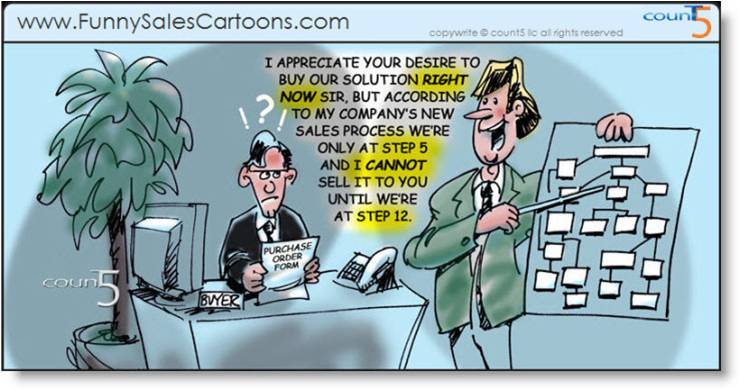Maureen Blanford challenged me with an interesting question, “What do you do with a person that consistently makes their numbers, but refuses to use the process?”
It’s a great question, here’s my take.
First, some set up. The sales process represents our organization’s best practices in winning business. We develop the sales process by looking at what our top performers consistently do to win deals, analyzing past wins and losses, and making sure what we do through the sales process is aligned and creates value through the customer buying process.
Consequently, leveraging the sales process is critical to getting each person to perform at the highest levels possible. Our job as sales leaders is to continually assure this, coaching and developing sales people so they can maximize their performance.
Now let’s get back to our sales person who consistently makes the numbers and refuses to use the process.
If she is a consistent top performer, she may have something. We may want to look at what she’s doing, incorporating critical aspects to improve the overall sales process—raising the performance bar even further. Consequently, much of what this sales person is doing is incorporated into the process. She might also see new things in the process that enable her to ratchet up her own performance (top performers tend to do this).
This becomes a real win all around. We’ve learn more, we’ve raised the bar and will see improvement in what she does, but the rest of the organization will improve as well–benefitting from her experience captured in the new sales process.
If, on the other hand, our sales person is making the number, but not a top performer, he is leaving money on the table–in the form of commission/bonus dollars to him, and revenue to us. See what’s happening, if he isn’t using the process, is he isn’t maximizing his performance—since that’s what the sales process should facilitate. He isn’t leveraging our best practices in winning, so even though he is making the number he has the potential to do even more.
I’d make sure the sales person understands this. I’d appeal to his sense of “greed” by showing him he could make more money by leveraging the process. If he’s smart, and he probably is, if he consistently makes his number, he probably will jump right to it.
See that’s what we miss when we “impose” a process (or a program, or a tool) on sales people. Until we show them what’s in it for them, there’s no reason for them to change what they are doing and what they feel is making them successful. We have to show them what’s in it for them, whether it’s more commissions, or makes it easier for them to do their job, makes them more impactful with the customer, makes them win more faster, or whatever.
Now here’s the bit of nastiness–maybe it’s just a peculiar quirk of mine. If, after all this, the sales person still doesn’t see the light. If he isn’t as smart as I think and adopts the sales process to serve his own self interest, then I’d raise his quota. (I’m really a sick SOB, aren’t I?)
See, if he’s somehow made his number through sheer dumb luck, and just wants to coast through, making his number, but not maximizing his earnings. He’s going to be forced to scramble. He’s going to be forced to change if he wants to make his number. I’d encourage him to do it the “easy way,” and use the sales process. He needs to do something and he’s most likely to start using the sales process.
Perverted leader that I am, if that doesn’t get the person to use the process, then I keep raising the quota. At some point he will use the sales process because it’s the only way he can possibly make his number. Or, he might not–but emerge as a top performer, in which case, we know what to do (go back and re-read the top performer paragraphs).
Most good sales people figure things out. They’re pretty smart and will work to achieve their goals. If the large part of the organization is not using the sales process–but still making their numbers, then something’s wrong with the process (our people’s actions are telling us something important.). But if we’ve got a great process in place, and one or two aren’t using it, we need to focus on what’s in it for them.
How’d I do Maureen? Thanks for the challenge!

Dave – thanks so much for taking the time to do this. It’s a tricky issue for many organizations and can impact several critical areas for sales managers and execs – not the least of which is accurate forecasting.
We certainly don’t want to over-burden our salespeople, but process compliance is important as you’ve noted.
You rock man!
Maureen, sorry for the slow reply, I’ve been on the road. Thanks so much for the question stimulating the post.